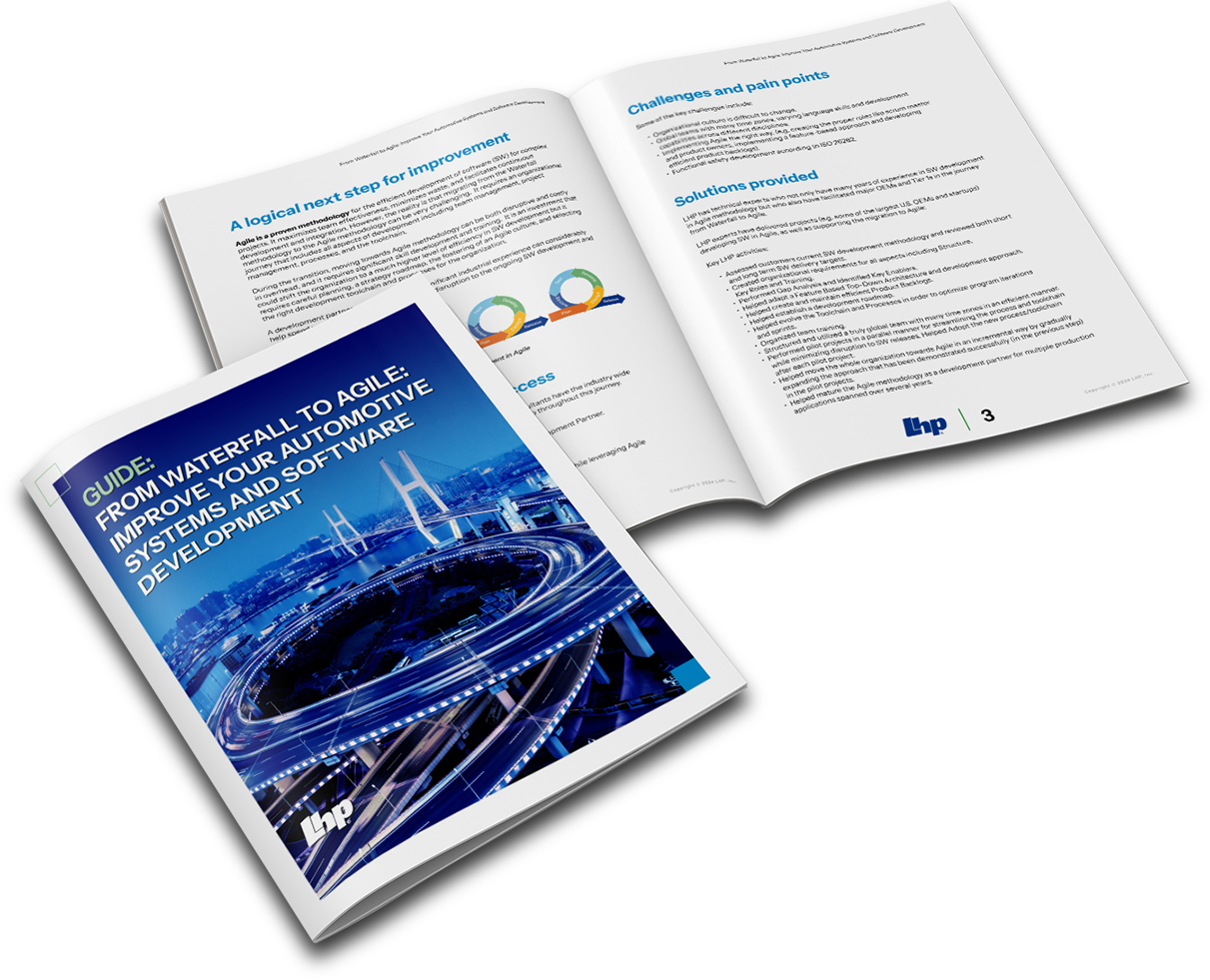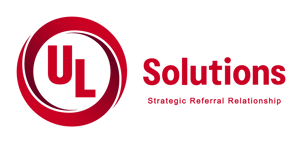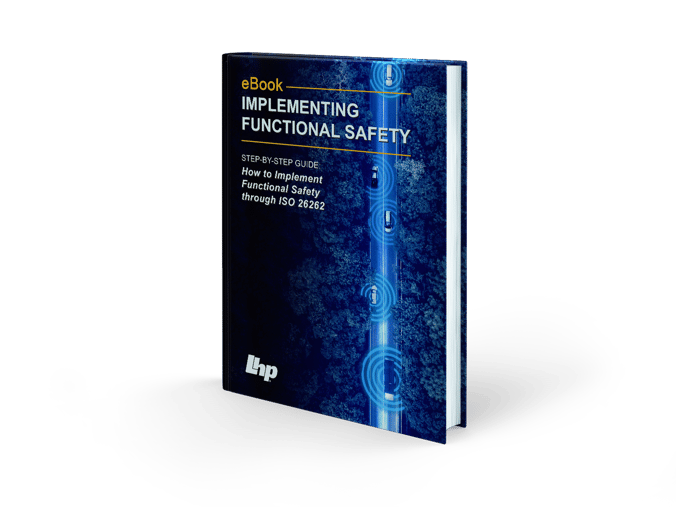Embedded Systems and
Software Development
Our Embedded Systems and Software Development solution delivers high-quality certifiable software while leveraging Agile methodologies for continuous integration and delivery.
LHP offers an embedded solution that delivers complete end-to-end embedded controller development for global OEMs and their suppliers within the automotive, aerospace, medical device, and rail industries. Innovators like these require controller and software development driven by state-of-the-art proven processes, validated by the application of safety and quality standards such as functional safety, cybersecurity, ASPICE, and SOTIF… and LHP delivers!
Unlike unproven and unstructured third parties who do not possess a certified process and often leave you stuck with an unfinished product that isn’t ready for commercialization, LHP’s Embedded Systems and Software Development Solution gets it right the first time, accelerating your product releases and increasing your credibility across the transportation industry.
LHP’s Embedded Systems and Software Development Solution is built upon decades of best practices from multiple safety-critical industries, consolidated into one optimized workflow for embedded controller and software development. LHP’s proven solution delivers confidence in product design and validation, reduces liability, and guarantees commercial viability.
Avoid the expensive pain of trying to build a state-of-the-art workflow internally from scratch, or enduring an inferior and less-capable ad-hoc offering that fails to deliver what you need to be competitive. Instead, choose a proven professional-grade winner. LHP is unleashing the power of proven certified agility in a world filled with stagnant indecision!
Industries We Serve


Automotive

Commercial Vehicle

Other
Deliver Certifiable Software while Leveraging Agile Methodologies
LHP is the global functional safety leader committed to guiding clients in their development of safe, software-defined vehicles through Functional Safety consulting, solutions, training, and testing. Time and time again, global OEMs and their suppliers reach out to LHP because they are struggling to keep their existing software and systems development processes on pace with the latest industry standards. LHP’s methods and processes deliver certified software that can be continuously tested and iterated to support your ever-changing customer demands. Our approach accelerates successful product releases and increases your credibility across the transportation industry, improving your product’s commercialization.
With in-depth competence in functional safety, embedded controls, and embedded software, LHP guides and enables you to reduce the cost of production and deliver a safety-critical product.
UL Certification from the Global Leader
The methods and processes utilized by LHP's Embedded Systems and Software Development Solution are independently certified by Underwriters Laboratories (UL), the premier global leader in applied safety science. You get greater peace of mind knowing your products are being developed using efficient and vetted methods that have been proven to work. Certification helps ensure that your products are safe, secure, and sustained in the competitive marketplace.
Stop the Chaos
Typical service providers often use development processes that are uncertified, unstructured, inefficient, and mired in the stale internal bureaucracy of their inflexible company status quo, causing you the pain of suffering through unnecessary complexity, massive amounts of wasteful and expensive rework, and the added risk of quality and safety defects.
In contrast, LHP's Embedded Systems and Software Development Solution empowers you to avoid all that pain. We utilize internationally certified leading system engineering methods across all aspects of software development while leveraging Agile methodologies for continuous integration and delivery.
LHP brings you decades of trustworthy experience and a proven reputation for delivering commercially viable products that meet or exceed the latest safety and quality standards. We maximize efficiency and minimize the risk of quality defects across the full product development lifecycle.
Embedded Systems and Software Development
Areas of Expertise

System and Software Development
Case Studies
The Product Readiness Level (PRL) Process
The Product Readiness Level (PRL) Process in LHP’s Embedded Systems and Software Development Solution consists of six phases performed in a linear order. Each phase is delineated, with tasks, roles, reviews, gateways, and entrance and exit criteria. Within each phase is a series of tasks and reviews performed by clearly defined teams, owners, and roles. The defined activities must be performed, and the criteria met, before the project can advance from one phase to the next.
-Process-Graphic-New-Design-r02.png?width=3950&height=1592&name=Product-Readiness-Level-(PRL)-Process-Graphic-New-Design-r02.png)
This phase aims to rigorously evaluate the foundational aspects of the prospective project, ensuring that the proposed deliverables are well-conceived, thoroughly developed, and based on a solid framework. This phase focuses on confirming that the costing, pricing, scheduling, and performance commitments are sufficiently robust and backed by credible data, enabling a seamless progression to the subsequent Technical Bid Review.

Upon contract acceptance, it ensures alignment of project activities, confirms the feasibility and understanding of product/project functions, and sets a requirements baseline. Resource allocation and strategies are refined based on initial proposals and any negotiated changes. Key customer and supplier interfaces are established, and the phase concludes by developing system and preliminary detailed designs, laying a foundation for future stages.

Translate preliminary designs into detailed design solutions that satisfy the requirements and specifications. While maintaining project plan updates, adhere to applicable engineering disciplines such as ISO 26262 for functional safety, cybersecurity guidelines for data and system protection, and ASPICE for quality management. To summarize, this phase bridges the gap between conceptual ideation and product implementation.

During this phase, individual system components are realized ensuring both hardware and software elements are built and integrated, until an operation system is brought up to match detail designs. This would include Test Equipment builds and integration with systems. Build instructions developed from design information for the First Article assembly will be verified. To reduce formal Verification and Validation (V&V) risk, often dry runs of V&V test procedures are conducted at this phase.

Through a blend of unit and system tests, the project's compatibility, security, and performance are meticulously verified and validated to the component, sub-system to system levels. Any discrepancies are raised and rectified, thereby validating the system's completeness, performance, and adherence to quality, safety, and security processes.

This phase is to ramp up and sustain large-scale manufacturing of the finalized product, ensuring consistent quality, efficiency, and timely delivery. Building upon the learnings and optimizations from the preceding phases, particularly the low-rate production, this phase focuses on maximizing production output while maintaining stringent quality standards. This involves streamlining supply chain processes, optimizing production line operations, effectively managing workforce resources, and ensuring that both regulatory requirements and internal benchmarks, such as ISO 26262 and cybersecurity standards for automotive products, are met consistently. By achieving a seamless and efficient full-rate production, the organization aims to meet market demands, realize economies of scale, and deliver a product that is both reliable and profitable.

LHP Delivers Transformative Results that Work
LHP delivers on its value by achieving or exceeding the client’s objectives. When the client’s strategic needs are met or exceeded, the resulting success is transformative. The deliverables bolster confidence, as working with LHP brings positive change through the outcomes of the process:
- Meets the highest industry standards for safety and quality.
- Leverages Agile methodologies for continuous integration, delivery, and testing of software.
- Provides fast and efficient development time.
- Aligns software developers and integrators from concept to production.
- Utilizes processes that have been vetted and certified by Underwriters Laboratories.
- Reduces wasteful rework.
- Reduces the risk of quality and safety defects.
- Empowers you to efficiently and predictably achieve successful product releases.
- Improve your commercialization.
Sustainable Engagement Model
-
Immediate Response
(Phase 1)
Fully scoped, fixed bid projects
Immediate response + start times
Routine feedback
Solution Architects + Sr. Engineers
Project-based work packages
Start with World-Class Technical Experts
-
Transition Period
(30-60 Days Out)
Reduces overall total costs -
introducing a blended teamLHP’s investment -
project management, issue escalation, equipment, recruiting, and training-

Blend in Lower Cost Engineers
-
Sustainable Team
(Phase 2, Day 90+)
Financially viable
Fully trained/optimized engineers
Dial up/down team as needed
Retention of all project knowledge
High retention rates
Guaranteed delivery
Delayed start times w/ commitment/PO-

Sustainable Team and Lower Total Cost
Waterfall to Agile migrating
is not straightforward.
Read the blog to learn of the challenges!

System and Software Development Blog Posts
7 min read
Implementing Responsible AI for Automotive Vehicle Safety
Steve Neemeh: Oct 20, 2025
7 min read
Embedded Software Development: How AI is Transforming Vehicle Safety?
Steve Neemeh: Oct 9, 2025
4 min read
LHP’s Safety Supervisor Software for Smart Vehicle Platforms
Ronaldo Castillo: Feb 17, 2025




-01.1.png?width=557&height=500&name=LSS-VP-Case%20Study-LHP-ENGINEERING-SOLUTIONS-AND-SONATUS(...)-01.1.png)




